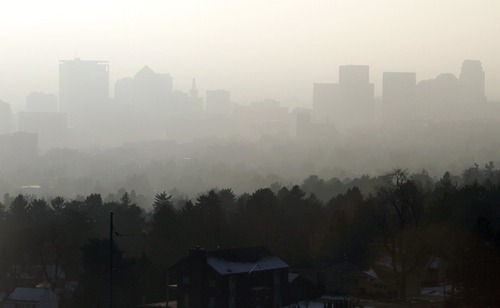This is an archived article that was published on sltrib.com in 2011, and information in the article may be outdated. It is provided only for personal research purposes and may not be reprinted.
Federal regulators are poised to step in and take over part of Utah's air-quality oversight if Utah doesn't close a longtime pollution loophole.
The U.S. Environmental Protection Agency will make its position official in a Federal Register notice Monday on Utah's "unavoidable breakdown" rule for industrial polluters. And the state Division of Air Quality and Utah's regulated industries are weighing their options, including the possibility of going to court to avoid an EPA takeover of these duties next year.
Meanwhile, Jeremy Nichols, an attorney with Colorado-based WildEarth Guardians, called the EPA's action the right thing to do to protect public health and carry out the federal Clean Air Act.
"This is about making sure we have safeguards that protect the public health," Nichols said. "EPA's putting its foot down — and rightly so."
Nichols' group forced the EPA crackdown with a 2009 lawsuit. But the disagreement really began years earlier. It centers on a regulation that applies to about 1,200 businesses with state air-pollution permits.
When a refinery, cement plant or other regulated facility spews pollution into the air because of a breakdown, regulators must automatically treat it as a violation of the law, as the EPA sees it. The agency assumes such a problem is the result of shoddy maintenance or careless operation. By contrast, Utah regulators assume a breakdown is not a violation unless proven otherwise.
Industry likes Utah's approach because it gives plant operators an opportunity to explain the circumstances before being accused of a violation. But the EPA and environmentalists say Utah's rule makes it hard for the public and regulators to keep tab on the excess pollution from an estimated 20 to 40 episodes of unplanned pollution each year.
The EPA did not return a call seeking comment on the imminent crackdown.
But in the notice prepared for publication Monday, the agency said: "This [unavoidable breakdown] rule undermines EPA's, Utah's, and citizens' ability to enforce emission limitations" necessary to achieve clean-air standards.
In one part of the 51-page notice, the EPA says defenders of Utah's rule refuse to address EPA's concern that it is inconsistent with the Clean Air Act. They "appear to assume the need to pollute trumps protection of" national air-quality limits, the agency said.
The EPA also said it will put off a decision on whether it will seek sanctions — including a cutoff of federal highway funding of around $200 million a year — if the state does not improve the regulation within 18 months.
DAQ's Bryce Bird said Friday he had not seen the final wording on EPA's notice. But he insisted Utah's current rule is "very strong." He added that there has never been a case in which an unavoidable breakdown has resulted in emissions that exceeded federal air-quality standards in Utah.
Jim Holtkamp, an attorney representing the Utah Mining Association, the Utah Manufacturers Association and the Utah Petroleum Association, noted that Utah regulators and regulated industries have worked with EPA for years on a resolution.
Now, he said, there are two possible courses of action: Find acceptable wording, as states like Colorado and Wyoming have done, or go to court to fight what supporters of Utah's regulation see as EPA's overreach.
"We haven't met yet to see what approach we are going to take."
What's happening?
The EPA says Utah's law on unplanned pollution episodes from power plants, refineries and other regulated facilities fails to comply with the Clean Air Act. If Utah can't fix the regulation within 18 months, federal regulators will assume control over these unavoidable breakdowns and possibly impose other sanctions.
—
What's next?
P Regulated companies and the state have 60 days to decide whether they will try to get a court to overrule EPA or they will try to rewrite the regulation to EPA's satisfaction.



